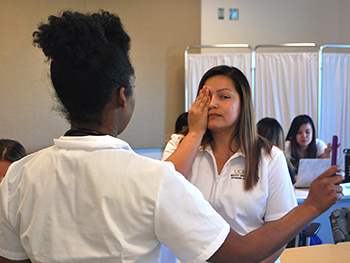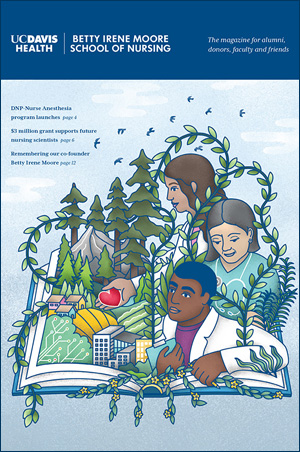Master’s Entry Program in Nursing students work with patients in their first quarter

During their first quarter, students take Health Assessment Across the Lifespan, a hybrid classroom-clinical course that introduces students to conducting health histories and assessments.
Often, accelerated, entry-level nursing students spend the first portion of their graduate studies in the classroom before venturing out to interact with patients. Master’s Entry Program in Nursing students at the Betty Irene Moore School of Nursing at UC Davis, though, begin their clinical experiences in their very first quarter.
“Historically, there’s been an attitude or concept that nursing education should integrate patient interactions slowly, that we need to warm students up to it,” said Kupiri Ackerman-Barger, associate dean for Health Equity, Diversity and Inclusion. “We feel that the sooner these students engage with patients and interact with them as humans, the more meaningful this will be to their education. They will make a close connection between the theory they learn in the classroom and the practice they observe or conduct.”
Early clinical exposures and purposeful integration of theory and practice aren’t the only unique features of the new UC Davis nursing program. The entry-level program also features a case-based curriculum where learning activities, based on realistic clinical scenarios and fictional patients, are presented throughout several courses during the same time period so students learn related concepts in deep ways with complex intersections. Rarely do more traditional nursing programs make use of case-based learning to integrate concepts mapped across courses and the curriculum. This innovative approach decreases course isolation and facilitates students’ learning and teamwork.
For example, students might study blood flow and oxygenation in the biophysical concepts course. During that same week, they study medications related to the cardiovascular system in the pharmacology course and practice cardiopulmonary assessment in the health assessment course. At the end of the week they engage in a simulation experience in the foundations of clinical nursing practice course, where the patient — an actor — presents with a variety of conditions and symptoms that require further assessment and care planning.
During their first quarter, students take Health Assessment Across the Lifespan, a hybrid classroom-clinical course that introduces students to conducting health histories and assessments. The course includes an hour-long discussion, a three-hour lab and four hours of clinical exposure each week. According to Associate Dean for Academics Amy Nichols, the students are consistently exposed to different stages of learning and concept development through this structure.
“They hear it and learn it; they explain and practice with each other in labs; and then they apply it in real life as well as talk about it with peers and clinical instructors afterwards,” Nichols said.
After a month of basic introduction, discussion and practice with each other, students travel to community sites throughout the region to conduct health histories and assessments as well as develop care plans with real people. The first sites include two retirement communities — one in a middle-income neighborhood and the other in an underserved community.
“Through this experience, they will learn to talk with different groups of people, ask questions and learn that how they connect with different people will vary,” Nichols said.
Another unique aspect of the Master’s Entry Program in Nursing is a focus on social determinants of health to prepare leaders who are equipped to address California’s unique and changing health care needs and serve as leaders to help direct and respond to regional and national trends in the future. Along with the health assessment course, students complete the Social, Cultural and Behavioral Determinants of Health course.
“This allows close connection between theory and practice,” Ackerman-Barger said. “This integration allows students to take what they learn in discussion and the classroom and more readily translate it into clinical practice where knowledge of health disparities and effective means to promote equity are critical to expert nursing care.”





